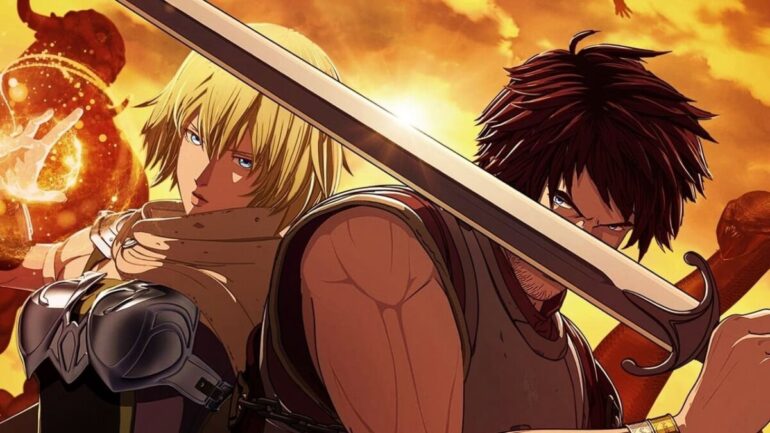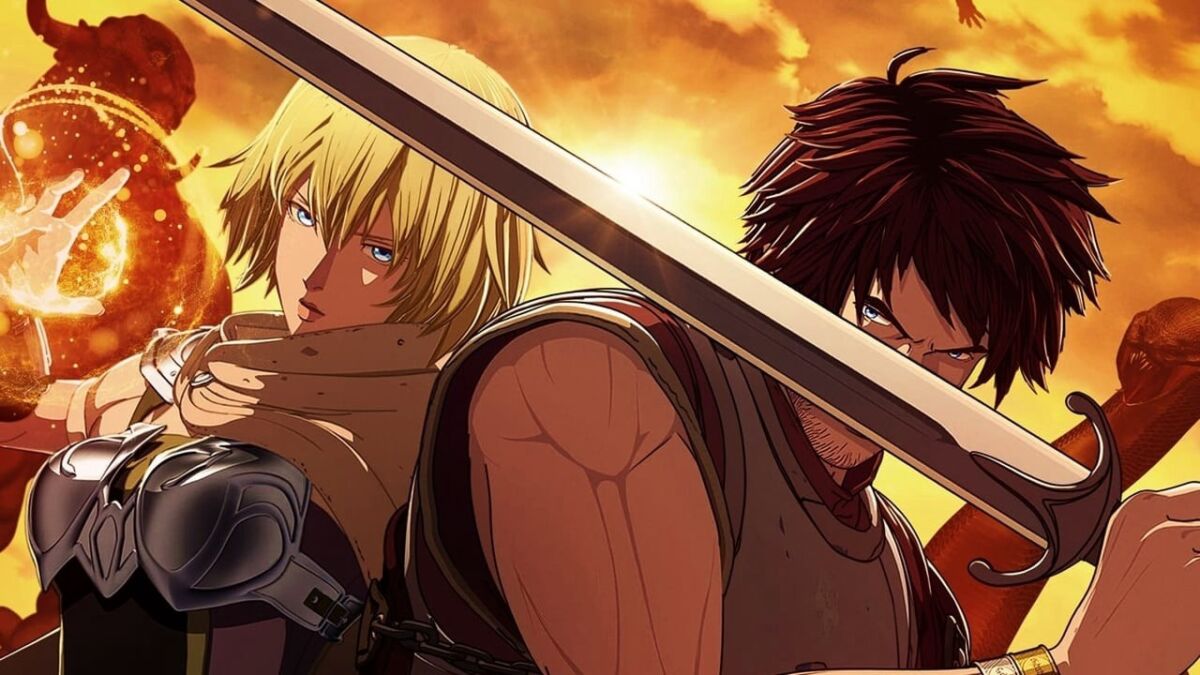Someone at Netflix must really love video games. Between their adaptations of Castlevania and The Witcher, the people at the granddaddy of streaming services are very keen on greenlighting televised versions of fan-favorite video game franchises. Dragon’s Dogma is an exciting, if peculiar, choice for an anime adaptation.
While the game isn’t quite a mainstream hit, as the original had one DLC expansion and one sequel, Dragon’s Dogma Online, the series has a strong cult following, and the game’s philosophically dense plot and rich world have huge potential for an anime-flavored jump into television.
Adapted from the 2012 video game, Dragon’s Dogma has the same general set-up as its source: In a medieval fantasy world, an enormously powerful dragon attacks a town, laying waste to everything in sight, and plucks the heart out of one particular townsperson. The victim doesn’t die, however, but becomes an Arisen, a person kept alive through force of will, magic, destiny, or some combination of the three.
In the game, the Arisen in the player’s avatar, but in the Netflix series, it’s Ethan (voiced by Greg Chun), a vague character who runs out of depth or new elements pretty early. He misses his wife, he wants revenge, and he gets very angry when he sees injustice being done. While these are fine morals, they don’t make for a particularly entertaining lead character. The fact that he’s named Ethan also suggests a frustrating lack of imagination. This is a world of magic and monsters. The Arisen is a being of magical significance. And his name is Ethan. This is one of a number of ways Dragon’s Dogma fails to live up to its own potential.
In order to give Ethan more of a motivation than being the avatar of a player who bought a video game, the writers give him a pregnant wife that he loves oh so very much, and by the end of the pilot, if you can believe it, she’s no longer with us.
Olivia (voiced Cristina Vee) is a character with a lot of personality and some welcome humor, but she’s criminally underserved by the plot. While she could have given us a new perspective on the fantasy adventure genre, she becomes yet another in a long line of fictional women created just to be killed and make a male character sad. Here again, the show chooses a well-worn path instead of looking for any nuance.
Ethan is assisted on his quest to kill the dragon that killed his wife by Hannah (Erica Mendez), a pawn, which is a magical humanoid being that exists purely to assist The Arisen. The ways this might complicate Hannah having free will and the ramifications of being a pawn are vast, but the show doesn’t find much time to dive into it. Early in the second episode, Hannah summarizes the writers’ advice to the viewers: “It does not matter if you understand. What matters is, it’s real.” So that’s that as far as world-building goes, I guess.
While the characters aren’t given much room to grow in the writing, the voice cast is overall quite strong. Chun gives Ethan as much pathos as he can, stitching together something resembling an arc for Ethan across the seven episodes’ loose, tenuously connected plots. Cristina Vee’s warmth and savvy in Olivia makes the character’s abrupt exit all the more frustrating, and Mendez gives Hannah an ethereal distance to make the pawn’s not-quite-humanity shine through. The Dragon (voiced by David Lodge, reprising his role from the games) gives the great beast tremendous gravitas and weight, even when his lines become too generic or faux-philosophical to be taken seriously, such as peppering his speech with “Thou”s like they were on clearance sale.
The season’s seven episodes adhere to a monster-of-the-week structure, a great choice for adapting a game very much focused on exploration, planning out individual excursions, and chance encounters with fantasy creatures. Through Ethan and Hannah’s journeys to find and kill the Dragon, their adventures bring them into contact with other people trying to make it in this violent fantasy world, from lowly peasants putting their daughter up for sacrifice to a town beset by drug addiction to wandering knights searching for purpose in their strange land of magic and mystery.
Each episode is named after one of the seven deadly sins, and likewise each episode’s monster-of-the-week encounter centers around that mortal vice. This naming convention, and a focus on the concept of sins that the source game never really indulged in, is a perplexing one.What does an anime adaptation of Dragon’s Dogma actually gain from simplifying its massive magical universe and ornate, complex lore into seven bite-sized morality tales? What does Dragon’s Dogma even have to say about these morals? Turns out, not all that much, except that they aren’t good.
The episodes treat these subjects with the subtlety of a fire-breathing dragon destroying a village. The name of the first episode with said massacre-by-dragon? Wrath, of course. Such on-the-nose writing takes a lot of the fun out of the show, as we can’t ever find time to enjoy the world or find any sense of wonder in Ethan and Hannah’s travels without remembering that Lust is not cool, dude, in a Dungeons & Dragons version of an anti-drug PSA.
Among all of these misadventures, Ethan’s vendetta against the Dragon fades into the background. The journey to find the Dragon ends up amounting to Ethan asking around town if anyone knows where to find it, and the six middle episodes feel less like a grand heroic journey and more like a player killing time grinding for experience before taking on a tough boss. The final episode does give some overdue closure and direction for Ethan’s journey, but it’s all delivered in a seismic exposition dump, and the ultimate impact of these revelations is robbed by how suddenly the show throws out so much crucial information.
The show’s overarching theme, if there is one, seems to be about power, and the way it corrupts people, making it easier for them to behave inhumanely toward the rest of humanity. However, any attempt to treat the show’s heavy-handed messaging as sincere is somewhat marred by the show’s gratuitous sex and gore, which are so pervasive and frequent that it feels like Dragon’s Dogma is chasing the wrong aspects of Game of Thrones.
Continuing the trend established by Olivia’s unceremonious death, women do not fare particularly well in the world of Dragon’s Dogma, and while of course a piece of art can depict violent or upsetting behavior without condoning it, Dragon’s Dogma puts a special lens on female suffering just often enough for it to feel like a strange trend, especially in the particularly misogynistic and exploitative third episode, which viewers not prepared to weather depictions of sexual assault should consider skipping alogether.
Visually, the show’s 3D animation style, which is increasingly becoming the norm for Netflix’s anime projects, is a mixed bag. The quiet moments are Dragon’s Dogma’s animation at its best: Ethan and Hannah sitting by a fire, two soldiers nervously eyeing each other while standing before a mountain of gold, a family welcoming a child they thought was lost. However, when it comes time for action, the models sometimes appear wonderfully kinetic and fluid, but more often than not they’re painfully awkward and stilted, with no middle ground.
The monster design is likewise a coin-flip. Occasionally it gives us some fun and imposing monster designs (a Hydra in an early episode stands out), but more often than not, making a monster that should strike the fear of god in mortals appear to be a doughy and inoffensive as a lump of play-doh. The Dragon is the most adversely affected, especially in the first episode, where its ominous descent occurs with all the dread and foreboding of lowering an action figure over some other action figures.
Dragon’s Dogma deserves points for its ambition, and for rejuvenating a franchise that fans have been crying for a sequel to for literal years. Sometimes it even sticks the landing on cutting insight into human cruelty, entitlement, and abuse of power.
For all of the above flaws, the show is never dull to look at or boring to watch. Despite not being much of a binge-watcher, I watched all seven episodes in one day and never felt tired out by the time I’d put in. However, the show’s pleasures are undeniably fleeting and its ambitions are misplaced, and all the effort that was put into giving Ethan a grounded, dark, and edgy backstory to motivated a grounded, dark, and edgy journey might have been better suited trying to capture any sense of grandeur or atmosphere for the world.
Finally, it is a crying shame that they couldn’t get the theme music from the game’s original title screen for the opening credits — because come on, listen to this — and imagine what could have been.
READ NEXT: 15 Best Horror Movies on Netflix You Should Watch
Some of the coverage you find on Cultured Vultures contains affiliate links, which provide us with small commissions based on purchases made from visiting our site.


